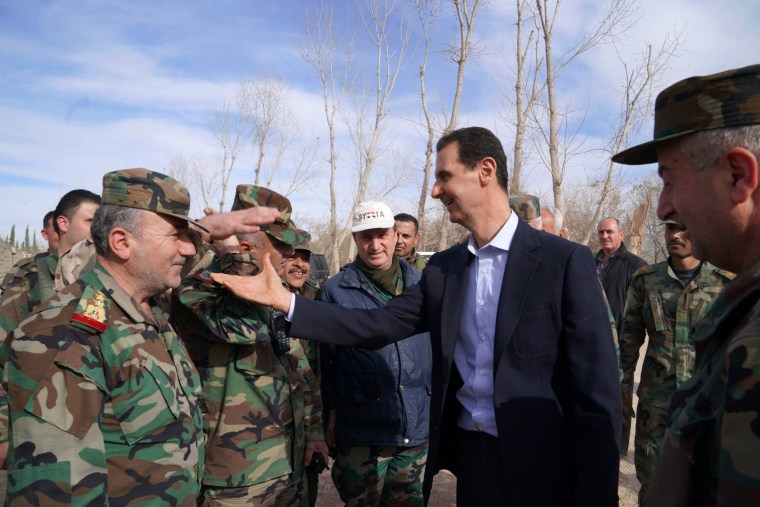News Analysis
President Donald Trump’s tweets on Sunday calling Syria’s President Bashar al-Assad an “animal” for the suspected use of poison gas on his own people were extraordinary on many levels.
First, they undermine Trump’s stated determination to get out of Syria, having argued with his military advisers only last week that he prefers to get U.S. troops out in months, not years.
Second, by calling the attack "mindless," an "atrocity" and a "humanitarian disaster," Trump would appear to have locked himself into retaliating with at least a symbolic, targeted airstrike against the regime for what appears to be yet another use of internationally banned chemical weapons — as Trump did on April 6, 2017, almost exactly a year ago.
In that case, the president ordered the bombing of the runway in Syria from which, the U.S. said, planes carrying the chemicals took off, even as he was hosting China’s President Xi Jinping in Mar-a-Lago. (And said he’d informed his guest of the military strike at dinner “over the most beautiful piece of chocolate cake you’d ever seen.”) U.S officials acknowledged that the runway was quickly rebuilt.
Early Monday, Syria's state-run agency SANA reported that missiles hit an air base in central Homs province. Russia blamed Israel for the pre-dawn strike and Lebanon's Iran-backed Hezbollah militia, which is fighting with Assad's forces, described the attack as an "Israeli aggression." Later, two U.S. officials confirmed to NBC News that Israel had carried out the strike after informing the U.S.
Regardless of who targeted the air base in Homs overnight, last year’s strike clearly did not deter Assad’s subsequent reported use of chemicals, and again this weekend, as alleged by opposition groups and medical teams from the White Helmets. Now the question is whether the condemnation today from Trump — who does not like to appear to be defied — will require him to launch another symbolic airstrike, or take even stronger military action to avoid appearing weak on the global stage.
It is not clear what impact the reported atrocity will have on Trump's expressed hope for an exit strategy from Syria, which is not only riling the Pentagon, but also alarming key allies including Israel and France. The Syrian situation, along with the Iran nuclear deal and proposed U.S tariffs against the European Union, were already going to be contentious issues that could spoil the first state visit in the Trump administration when France’s President Emmanuel Macron arrives in Washington in a few weeks.
There was a third irony in the president’s Sunday Twitter outburst. In his tweets, he blamed Iran and, importantly, Russia, without whose military intervention in 2015 Assad could not have survived. It was the first time he had strongly criticized Russian President Vladimir Putin in a tweet.
But Trump also held President Barack Obama responsible for Assad, tweeting Sunday, “If President Obama had crossed his stated Red Line in The Sand, the Syrian disaster would have ended long ago! Animal Assad would have been history!”
Indeed, there was a torrent of criticism against Obama for not taking military action against Assad over Labor Day weekend in 2013 in response to his use of chemical weapons in the civil war, severely undermining then-Secretary of State John Kerry, who had publicly telegraphed that a military response was imminent.
But now Trump has created his own red line against Assad, this time without a confirmed secretary of state and just as a new national security adviser is taking over on Monday. And reportedly he is increasingly ignoring the advice of his chief of staff, retired Gen. John Kelly, and resisting policies on Syria advocated by Defense Secretary James Mattis, a retired four-star Marine.
Add to the confusion his recent, seemingly ad-libbed suggestion of inviting Putin, Assad’s protector, to the the White House. It all leaves Trump facing a complex series of military and foreign policy challenges that could confound the most adroit and well-staffed commander-in-chief.
In the days to come, Trump may well discover the perils of conducting foreign policy on Twitter.

